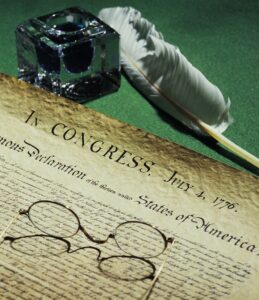Everyone loves freedom. We dream of it. We march for it. We fight wars to secure it. We celebrate it. The fact that it often comes with a hefty price tag indicates how dear a commodity independence is. But is declaring independence always a good idea? Following are four examples. See what you think.
Individual Independence

From an early age, children demand freedom to explore their surroundings. For approximately two decades, parents teach their children lessons and life skills needed in the larger world, and they make sure they get a good education so they will be able to provide for themselves and their future families. All the years of their continuous work contribute to the maturing of their offspring into young adults, prepared for the day they will declare their independence.
Does this sound like a good declaration? Most parents would say it’s a great one.
National Independence
Nations also can declare independence, as America did in the summer of 1776. Unlike individuals spreading their wings, though, it wasn’t a matter of America naturally growing away from the mother country. Here’s a short history refresher:

A great many colonists had come to the new land for freedoms they did not have in England. However, the tyrannical British hand had reached clear across the Atlantic to consistently abuse and destroy their rights. Among other things, the king had deprived them of jury trials, cut off their trade with the rest of the world, imposed taxes on them without consent, abolished their representative house, and forced them to provide for British troops stationed in their towns. And it was only a matter of time before Britain would make good on its threat to place a state-established church over them as they had done in England in 1662. The colonists had no say in anything.
Even so, the decision of the Founding Fathers to break from England had not been hasty. The colonists considered themselves to be British citizens and had worked for reconciliation for over a decade. Just a year earlier, in 1775, Congress had sent the Olive Branch Petition to King George III as one more attempt to avoid a total separation between the two countries, but he wouldn’t even look at it. His response was to declare war.

After the armed fighting began, it would still be fourteen months before the colonists took drastic action. Not until word came in June of 1776 that German mercenaries were on their way (the king couldn’t find enough volunteer soldiers from his own country) was a formal proposal finally made to Congress that the colonies declare their independence.
It was an act of treason to sign the Declaration of Independence, but our Founding Fathers were willing to risk their lives to secure America’s rights because they understood where our freedoms ultimately come from. In the words of the text above their signatures, they believed “that all men are created equal, that they are endowed by their Creator with certain unalienable Rights, that among these are Life, Liberty and the pursuit of Happiness.” They recognized freedom as a God-given right of which no one should be deprived.
Was it a good thing that our forefathers declared their independence from the tyranny of King George III so the citizens of America could make their own choices about government, worship, and daily life?
Spiritual Independence

What about that unalienable right to liberty that comes from our Creator? That’s why Jesus came to earth. His Father sent him to preach the message of salvation that would free us from captivity (Isaiah 61:1; Luke 4:18). Paul defines that captivity: “…through Christ Jesus the law of the Spirit of life set me free from the law of sin and death” (Romans 8:2). With the tremendous price Jesus paid on the cross, he purchased our freedom from the sin that separates us from God and ends in eternal death.

We are released from enslavement to Satan’s rule, freeing us to make our own choices. However, it isn’t freedom to do anything and everything we want. Paul said, “You, my brothers, were called to be free. But do not use your freedom to indulge the sinful nature; rather, serve one another in love” (Galatians 5:13). Our independence is not for doing whatever pleases us—we would still be enslaved to our selfish, sinful nature—but to free us to choose well and serve God.
Is it a good thing that Jesus declared our independence from the tyranny of Satan so that everyone who would believe in him would be able to freely choose whom they would serve?
Independence from God
Declaring independence can free us from being forced to follow a path we don’t believe is right for us, and it allows us to make our own, and hopefully wise, choices. But even in our independence, we will always be dependent on someone else for certain things. Regardless of how self-sufficient we may think we are, we can’t do everything ourselves.

I am not able to repair my car or replace the ancient plumbing in my house. Nations need each other to come to their aid following a catastrophic event or to stand with them against a serious threat to their autonomy. And we cannot live in the spiritual freedom we were created for independently of the one who provides it.
The one who gives us freedom also provides everything else we have. God owns everything in the world, including us. “The earth is the Lord’s, and everything in it, the world, and all who live in it” (Psalm 24:1). He created the oxygen-filled air we breathe, our lungs to access it, our blood to carry the oxygen throughout our body, and our heart to pump it. Man may plant a seed to grow food, but God created the seed, as well as the water, nutrients, and sunshine necessary for its growth. Whatever abilities or talents we have, whether solving complex world problems or wiggling our ears, they come from him.

When we understand that everything we are and have comes from God, we will realize that we cannot live independently from him. America’s Founding Fathers recognized this. The same document in which they declared their independence from an earthly power also contained their strong declaration of dependence on Almighty God: “with a firm reliance on the protection of divine Providence.”
Declaring independence can be appropriate, necessary, and even of vital importance. Our desire for freedom is deep in our bones. But we must be careful to not declare independence from the one who created those bones and planted that desire.
Scripture quotations are from NIV.
Sources for historical information: Under God by Toby Mac and Michael Tait; wallbuilders.com
Feature photo by Hanna Zhyhar on Unsplash




Brenda+Murphy
June 22, 2023It’s true, there are some things we DON’T want freedom from. 🙂
bspencer
June 22, 2023Absolutely! Thank you, Brenda.
Angie Camp
June 22, 2023Hi Bonnie! Well, I CAN wiggle my ears! And I love the photo of the seed germinating! And one of my fav topics is the Providence of God – His provision, oversight, design, guidance, care, and salvation, Angie
bspencer
June 22, 2023Ha! How could I not know that you can wiggle your ears? I’m impressed.
That’s a great list of things we depend on God for. Thanks, Angie.